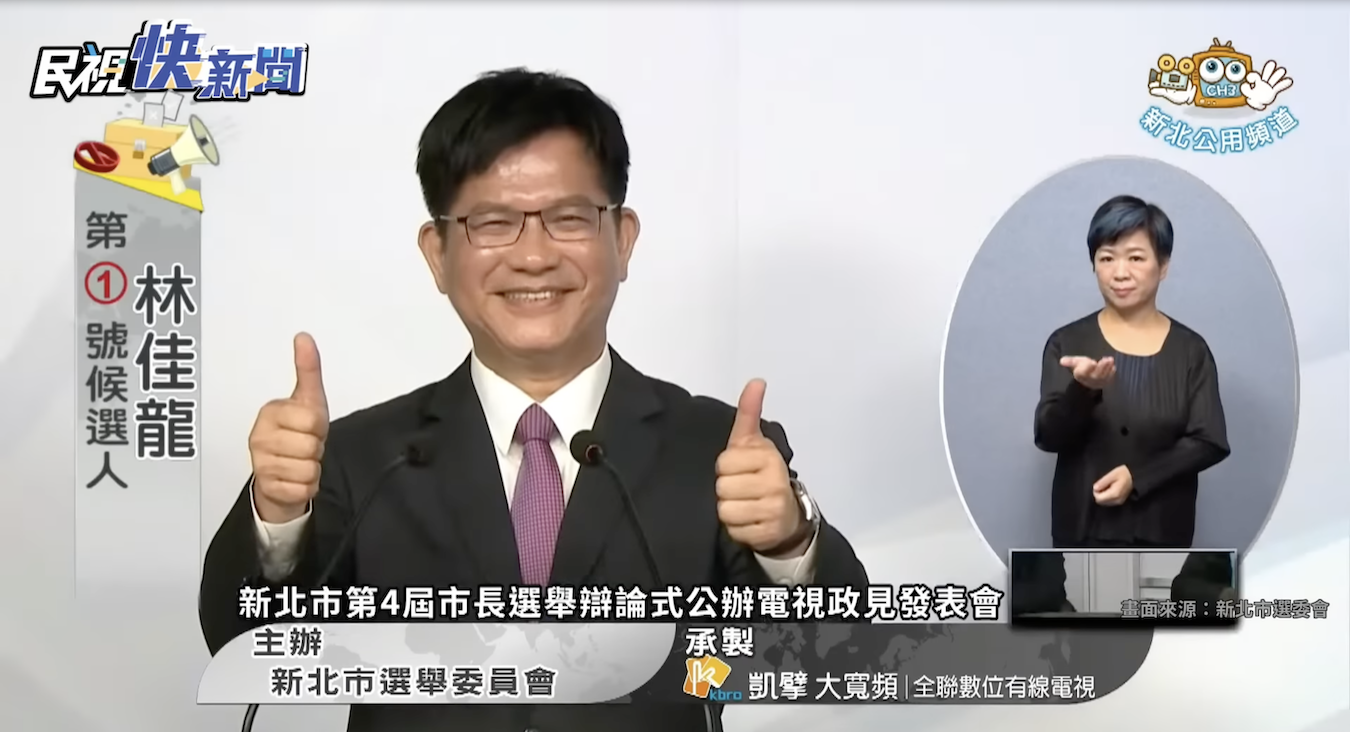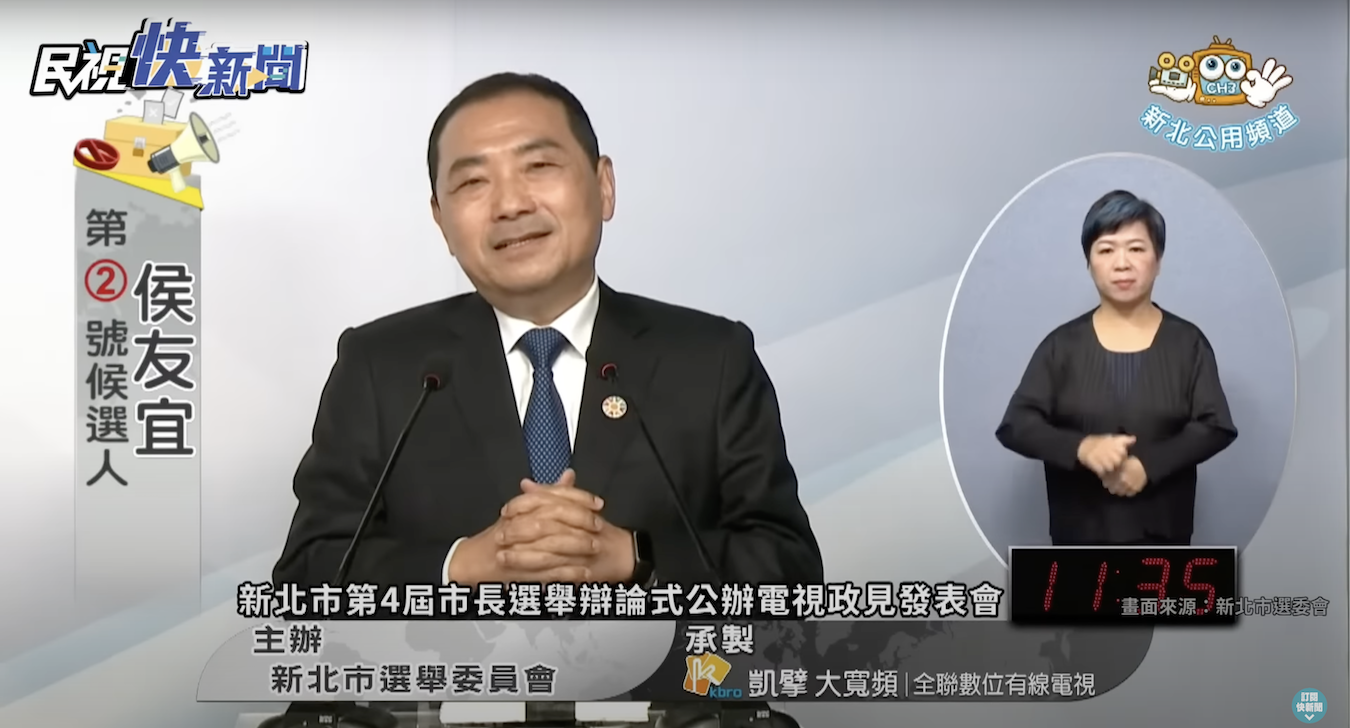by Brian Hioe
語言:
English
Photo Credit: FTV/YouTube
THE NEW TAIPEI mayoral debate took place on November 14th between incumbent Hou You-yi of the KMT and Lin Chia-lung of the DPP. As with some of the other mayoral debates, the first round consisted of opening statements by the candidates, followed by a round of questions from experts, and a third round of closing statements.
Hou You-yi was the first to speak. Hou began by touting the advantages of New Taipei’s geographic location and how he hoped for New Taipei to serve as a place for links to develop among cities in northern Taiwan. To this extent, Hou hoped to develop transportation links between New Taipei and other cities, and touted progress in New Taipei. A large focus of this was on cleaning up the city, such as with regard to industrial areas in Wugu and elsewhere, or stamping out drug use on the streets. Internal transportation networks in New Taipei, too, would be improved, such as regarding the Circular Line. More generally, Hou claimed that residents of New Taipei had become happier under his mayorship, and that he further aimed to develop links between New Taipei and the international world.
 Lin Chia-lung of the DPP. Photo credit: FTV/YouTube
Lin Chia-lung of the DPP. Photo credit: FTV/YouTube
Lin Chia-lung spoke next. Lin brought up that his parents were from different parts of Taiwan and played up New Taipei as a place of diversity, with many migrants from other parts of Taiwan. Lin stated this was why New Taipei had great potential to develop. Nevertheless, Lin’s comments were primarily focused on attacking Hou You-yi. Lin stated that because of Hou’s possible presidential ambitions, he might not finish his term. Lin suggested, then, that Hou was not committed to New Taipei, and that he had been in office too long, seeing as he previously served as deputy mayor under Eric Chu. Lin touted his experience as Taichung and, similarly, suggested he would develop transportation links in New Taipei, while also making housing more affordable for young people.
During the second round, the two candidates were asked about their views of the current election, which is viewed as comparatively lacking in intensity, and on cross-strait relations. Hou was asked about his presidential ambitions. Moreover, the two were asked about their expectations of turnout and margin of victory, and how they intended to address current planning issues facing New Taipei.
Hou avoided the question about his presidential ambitions, stating that he would maintain the same attitude irrespective of position dating from his experience as a police officer. As a result, Lin Chia-lung attacked him for his lack of specifics. Both claimed to defend Taiwan, though Lin phrased this in terms of Taiwan, and Hou You-yi in terms of the ROC. Hou stated that he mostly hoped to avoid personal attacks on his opponents, but criticized Lin for throwing his hat into the New Taipei race despite his lack of ties to New Taipei.
In the third round, consisting of closing statements, Lin criticized Hou as coasting off of the accomplishments of his predecessor, Eric Chu, and also benefiting from Tsai Ing-wen’s presidential administration. Lin claimed that New Taipei was in a state of decline under Hou and the KMT and called for a change of administration. Likewise, Lin criticized Hou over the “En En” scandal, regarding the lack of answers after a child died of COVID-19, and the response of New Taipei ambulance services was slow.
Hou’s closing comments stressed his past achievements, responding to Lin by asserting that Lin was defaming improvements in New Taipei. In particular, Hou touted improvements in transportation and safety, while emphasizing that his administration had clear and logical plans for improving New Taipei, and bringing up the concrete benefits provided by social welfare programs under his administration.
 New Taipei mayor Hou You-yi of the KMT. Photo credit: FTV/YouTube
New Taipei mayor Hou You-yi of the KMT. Photo credit: FTV/YouTube
With Hou largely expected to win the New Taipei mayoral race and thought to be a potential frontrunner for the KMT in 2024 presidential elections, Lin Chia-lung’s comments were focused on attacking him over the possibility that he will run for president. Consequently, discussion largely did not focus on policy for New Taipei, with Hou arguing for the successes of his mayoral administration while Lin suggested that New Taipei was in a state of decline under Hou.
At the same time, Hou has sometimes positioned himself unusually close to the pan-Green camp, despite being a KMT politician and emphasizing commitment to the ROC. This could also be seen during the debate, with Hou mostly avoiding direct attacks on Lin, and not directly attacking the Tsai administration over issues such as measures against COVID-19 or cross-strait relations. In this respect, this raises further questions about how Hou intends to position himself going forward–if he runs for president, he may intend to present himself as a “light blue” candidate who is not as ideologically hardline as other KMT candidates. Yet Hou may come under scrutiny from the KMT for his lack of apparent partisan commitment, which may create obstacles for him winning the KMT’s presidential nomination.

